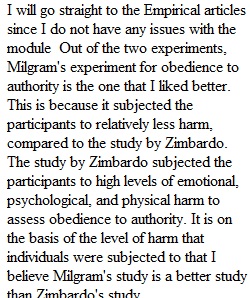


Q Please post in the blog after completing all quizzes and exercises in the module. Post here any questions or comments you have about the module material. • Is there anything puzzling or unclear? • Is there an 'aha' moment you have had while working through the module? • If nothing particular comes to mind with regard to academic journals and empirical articles, let's talk about research ethics: o Which study, Zimbardo's Stanford Prison Experiment (SPE) or Milgram's obedience to authority did you like better? o Do you think studies like that should be allowed? If yes, what are the benefits? If no, what are the main harms? o Can you think of other ethical scandals in research that you have heard about? Your initial blog post is due on second to last day of Module 2. Read through other students' posts: • Is there something you want to add or comment on? • Is there an answer you have for another student's question? Your answers or comments on two of your fellow students' posts are due on the last day of Module 2. Points are taken off for submissions after the due dates. It is especially important to abide by the due dates for blogs and discussions since other students are involved.
View Related Questions